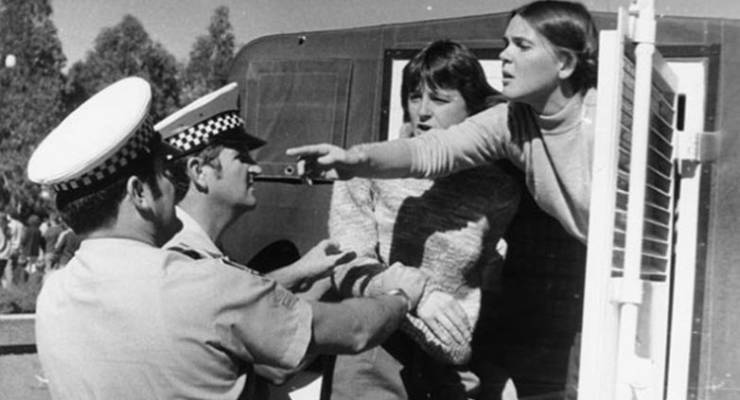
Activists arrested at the 1981 Anzac Day protest (ACT Heritage Library)
As I watched the ABC news doing its obligatory “preparations for Anzac Day” story I saw those huge concrete bollards being positioned across George Street and momentarily thought, “Gee, it would be hard to get across those”.
I was not making light of the serious issue of terrorism but I was recalling the day in 1983 that 161 women were arrested for “breaking up” the Sydney Anzac Day march, which ran down George Street. It has faded from our memories, but it was an important part of Australian feminist history.
The Women Against Rape in War protests of the early ’80s took place in Victoria, New South Wales and the ACT to highlight the previously undiscussed issue of rape and sexual violence against women being used as a tool of war. Although there was a clause in the Geneva Convention that outlawed sexual assault of women in war, it was not widely known and had never been invoked in legal cases or judgments.
The women’s movement in Australia had been increasingly concentrating on the issue of violence and many were reading the material of American radical feminist Mary Daly. This fed into the heightened anti-war sentiments of the Vietnam era and general anti “One Day of the Year” feelings about Anzac Day as a day which glorified war and machismo.
The Sydney Women Against Rape in War Collective was formed around the leadership of Quaker academic Sabine Willis and sociologist Rosemary Pringle at Macquarie University. We were influenced by the protests that had taken place in the ACT in 1981 and were determined to demonstrate against the 1983 Anzac march in Sydney. Our application for permission to march was refused and we took action in the courts. This received great publicity and even though we lost the case, the publicity continued.
We decided to march anyway, but to do so before the official march took place rather than directly confront it. This was in contrast to our Melbourne sisters who were much more confrontationist; they thought we were wimps (and perhaps we were).

On the day, several hundred nervous women gathered in Bridge Street under a banner proclaiming “We Mourn all Women Raped in all Wars” and marched silently down to George Street where we were confronted by a phalanx of police and eight paddy wagons. We then sat down in the middle of George Street. Some women refused to move when ordered and all 161 were arrested, silently and, we hoped, with dignity.
There was huge publicity about this action and a lot of ill-informed comment about how we had actually disrupted the march. I have never been in a protest where I got so much personal blow-back (when Sabine and I returned to work later that week, our Head of School gave us the rounds of the kitchen. He was furious.)
Were our protests a success? We definitely raised the issue of violence against women as an actual tactic of war, which had not really been understood. We also went some way towards changing the very macho character of Anzac Day.
We certainly didn’t adequately explain our issues about Anzac Day, but what protest movements ever do?







Thank you Crikey, and Meredith Burgmann, for your excellent pieces about Anzac Day. While Paul Keating was Prime Minister, I attended Anzac Day ceremonies, but I have subsequently found them to be intolerable, because of the untruthful mythologising which underpins them.
I first became aware of the issue on seeing it discussed on World at War, which mentioned briefly the actions of Red Army soldiers in Berlin in 1945, seemingly tolerated by their commanders, but the action of militants in the Balkans in the 90s caught the attention of more recent audiences. It is worrying that in this anarchic international environment as many players are repudiating the small gains made in human rights, dealing with this sort of war crime too may fall back.
This is the sort of history that I wish MzRaz would read.
And, perchance, understand.
I pay my respects to the diggers who fought for our freedom, to the traditional owners of our country, and to all the feminists before me who have fought to give me the freedoms I so enjoy today. The fight continues!!!
Great account and it seems such a long time ago now. Something has changed in this country. Nobody would have the guts today.
(And good to see “rounds of the kitchen” get a run!)
A lot of unwritten history here. A looming confrontation in Caberra was avoided that year when local member Ken Fry (a WWII veteran)came to an agreement with police to be allowed to lay a wreath for WAR (Women Against Rape in War) at the War Memorial to avoid a threatened confrontation. He was nevertheless temporarily expelled from the RSL until he won a defamation claim. During the laying of the wreath his daughter Kerry, was threatened with arrest even though she was not participating in any activity. Ken’s wife, Audrey intervened, declaring herself a veteran of WWII and challenging the officer to arrest her, if he wanted to go ahead and arrest her daughter. Something seriously wrong with police culture when officers feel they can arrest people on political cultural or ideological grounds. I am sure there are many more untold stories out there. Thanks Meredith.